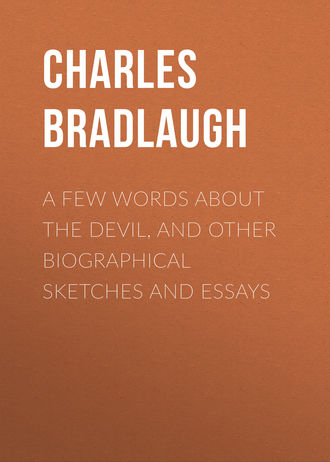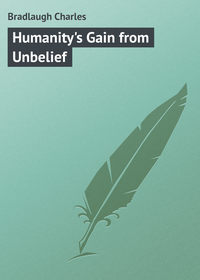 полная версия
полная версияA Few Words About the Devil, and Other Biographical Sketches and Essays
What is the value of this book of Genesis, which is the sole authority for the hypothesis that Adam and Eve, about 5,865 years ago, were the sole founders of the peoples now living on the face of the earth? Written we know not by whom, we know not when, and we know not in what language. If we respect the book, it must be from its internal merits; its author is to us unknown. Eusebius, Chrysostom, and Clemens Alexandrinus alike agree that the name of Moses should not stand at the head of Genesis as the author of the book. As to its internal merit Origen did not hesitate to declare the contents of the first and second chapters of Genesis to be purely figurative. Our translation of it has been severely criticised by the learned and pious Bellamy, and by the more learned and less pious Sir William Drummond. Errors almost innumerable have been pointed out, the correctness of the Hebrew text itself questioned, and yet this book is an unerring guide to the students of ethnology. They may do anything, everything, except stray out of the beaten track. We have, therefore, on the one hand, an anonymous book, which indeed does not take you back so much as 6,000 years, for at least 1,600 years must be deducted for the Noachian deluge, when the world's inhabitants were again reduced to one family, one race, one type. On the other hand, we have now existing Eskimo men, of the Arctic realm; Chinamen, of the Asiatic realm; Englishmen, of the European realm; Sahara negroes, of the African realm; Fuegians, of the American realm; New Zealanders, of the Polynesian realm; the Malay, representative of the realm which bears his name; the Tasmanian, of the Australian realm, with other families of each realm too numerous for mention here; dark and fair, black-skinned and white-skinned, woolly-haired and straight-haired; low forehead, high forehead; Hottentot limb, Negro limb, Caucasian limb. Do all these different and differing structures and colors trace their origin to one pair? To Adam and Eve, or rather to Noah and his family? Or are they (the various races) indigenous to their nature, soils, and climates? And are these various types naturally resultant, with all their differences, from the differing conditions for life persistent to and consistent with them?
The question, then, really is this: Have the different races of men all found their common parent in Noah, about 4,300 years ago? Assuming the unity of the races or species of men now existing, there are but three suppositions on which the diversity now seen can be accounted for:
"1. A miracle, or direct act of the Almighty, in changing one type into another.
"2. The gradual action of physical causes, such as climate, food, mode of life, etc.
"3. Congenital or accidental varieties."86
We may fairly dismiss entirely from our minds the question of miracle. Such a miracle is nowhere recorded in the bible, and it lies upon any one hardy enough to assert that the present diversity has a miraculous origin to show some kind of reasons for his faith, some kind of evidence for our conviction, and until this is done we have no reason to dwell on the first hypothesis.
Of the permanence of type under its own climatic conditions – that is, in the country to which it is indigenous – we have overwhelming proof in the statue of an ancient Egyptian scribe, taken from a tomb of the fifth dynasty, 5,000 years old, and precisely corresponding to the Fellah of the present day.87
The sand had preserved the color of the statuette, which, from its portrait-like beauty, marks a long era of art-progress preceding its production. It antedates the orthodox era of the flood, carries us back to a time when, if the bible were true, Adam was yet alive, and still we find before it kings reigning and ruling in mighty Egypt. Can the reader wonder that these facts are held to impeach the orthodox faith?
On the second point Dr. Nott writes: "It is a commonly received error that the influence of a hot climate is gradually exerted on successive generations, until one species of mankind is completely changed into another… This idea is proven to be false… A sunburnt cheek is never handed down to succeeding generations. The exposed parts of the body are alone tanned by the sun, and the children of the white-skinned Europeans in New Orleans, Mobile, and the West Indies are born as fair as their ancestors, and would remain so if carried back to a colder climate."88
Pure negroes and negresses, transported from Central Africa to England, and marrying among themselves, would never acquire the characteristics of the Caucasian races; nor would pure Englishmen and Englishwomen, emigrating to Central Africa, and in like manner intermarrying, ever become negroes or negresses. The fact is, that while you don't bleach the color of the dark-skinned African by placing him in London, you bleach the life out of him; and vice versa with the Englishman.89
For a long time there has been ascribed to man the faculty of adapting himself to every climate. The following facts will show the ascription a most erroneous one: "In Egypt the austral negroes are, and the Caucasian Memlooks were, unable to raise up even a third generation; in Corsica French families vanish beneath Italian summers. Where are the descendants of the Romans, the Vandals, or the Greeks in Africa? In Modern Arabia, 1830 years after Mahomed Ali had got clear of the Morea war, 18,000 Arnaots (Albanians) were soon reduced to some 400 men. At Gibraltar, in 1817, a negro regiment was almost annihilated by consumption. In 1841, during the three weeks on the Niger, 130 Europeans out of 145 caught African fever, and 40 died; out of 158 negro sailors only eleven were affected, and not one died. In 1809 the British Expedition to Walchereen failed in the Netherlands through marsh fever. About the same time, in St. Domingo, about 15,000 French soldiers died from malaria. Of 30,000 Frenchmen, only 8,000 survived exposure to that Antillian island; while the Dominicanized African negro, Tous-saint L'Overture, retransported to Europe, was perishing from the chill of his prison in France."
On the third point we again quote Dr. Nott: "The only argument left, then, is that of congenital varieties or peculiarities, which are said to spring up and be transmitted from parent to child, so as to form new races. Let us pause for a moment to illustrate this fanciful idea. The negroes of Africa, for example, are admitted not to be offsets from some other race which have been gradually blackened and changed in a moral and physical type by the action of climate, but it is asserted that 'once, in the flight of ages,' some genuine little negro, or rather many such, were born of Caucasian, Mongol, or other light-skinned parents, and then have turned about and changed the type of the inhabitants of a whole continent. So, in America, the countless aborigines found on this continent, which we have reason to believe were building mounds before the time of Abraham, are the offspring of a race changed by accidental or congenital varieties. Thus, too, old China, India, Australia, Oceana, etc., all owe their types, physical and mental, to congenital and accidental varieties, and are descended from Adam and Eve! Can human credulity go further, or human ingenuity invent any argument more absurd?"
But even supposing these objections to the second and third suppositions set aside, there are two other propositions which, if affirmed, as I believe they may be, entirely overthrow the orthodox assertion "that Adam and Eve, six thousand years ago, were the first pair; and that all diversities now existing must find their common source in Noah – less than four thousand three hundred years from the present time." These two are as follows.
1. That man may be traced back on the earth long prior to the alleged Adamic era.
2. That there are diversities traceable as existing among the human race four thousand five hundred years ago as marked as in the present day.
To illustrate the position that man may be traced back to a period long prior to the Adamic era, we refer our readers to the chronology of the late Baron Bunsen, who, while allowing about 22,000 years for man's existence on earth, fixes the following dates, after a patient examination of the Nilotic antiquities:
Egyptians under a republican form..... 10,000 B. C.
Ascension of Bytis, the Theban, first Priest King. 9,085 Elective Kings in Egypt......... 7,280
Hereditary Kings in Upper and Lower Egypt (a double empire) form......... 5,14390
The assertion of such an antiquity for Egypt is no modern hypothesis. Plato puts language into the mouth of an Egyptian first claiming in that day an antecedent 10,000 years for painting and sculpture in Egypt. This has long been regarded as fabulous because it was contrary to the Hebrew chronology.
If this be the result of the researches into Egyptian archæology, the reader will scarcely be surprised to find me endeavoring from other sources to get corroborative evidence of a still more astonishing character.
There are few who now pretend that the whole creation (?) took place 6,000 years ago, although if it be true that God made all in six days, and man on the sixth, then the universe would only be more ancient than Adam by some five days. To state the age of the earth at 6,000 years is simply preposterous, when we ascertain that it would require about 4,000,000 of years for the formation of the fossiliferous rocks alone, and that 15,000,000 of years have been stated as a moderate estimate for the antiquity of our globe. The deltas of the great rivers afford corroboration to our position as to man's duration. The delta of the Nile, formed by immense quantities of sedimentary matter, which in like manner is still carried down and deposited, has not perceptibly increased during the last 3,000 years. "In the days of the earliest Pharaohs, the delta, as it now exists, was covered with ancient cities and filled with a dense population, whose civilization must have required a period going back far beyond any date that has yet been assigned to the deluge of Noah, or even to the creation of the world."91
From borings which have been made at New Orleans to the depth of 600 feet, from excavations for public works, and from examinations in parts of Louisiana, where the range between high and low water is much greater than it is at New Orleans, no less than ten distinct cypress forests divided from each other by eras of aquatic plants, etc., have been traced, arranged vertically above each other; and from these and other data it is estimated by Dr. Benet Dowler that the age of the delta is at least 158,000 years; and in the excavations above referred to human remains have been found below the further forest level, making it appear that the human race existed in the delta of the Mississippi more than 57,000 years ago.92
It is further urged, by the same competent writer, that human bones discovered on the coast of Brazil near Santas, and on the borders of a lake called Lagoa Santa, by Captain Elliott and Dr. Lund, thoroughly incorporated with a very hard breccia, every one in a fossil state, demonstrate that aboriginal man in America antedates the Mississippi alluvia, and that he can even boast a geological antiquity, because numerous species of animals have become extinct since American humanity's first appearance.93
With reference to the second point, as to the possibility of tracing back the diversities of the Human Race to an antediluvian date, it is simply sufficient to point on the one side to the remains of the American Indian disentombed from the Mississippi forests, and on the other to the Egyptian monuments, tombs, pyramids, and stuccoes, revealing to us Caucasian men, and Negro men, their diversities as marked as in the present day. Sir William Jones, in his day, claimed for Sanscrit literature a vast antiquity, and asserted the existence of the religions of Egypt, Greece, India, and Italy, prior to the Mosaic era. So far as Egypt is concerned the researches of Lepsius, Bunsen, Champollion, Lenormant, Gliddon, and others, have fully verified the position of the learned president of the Asiatic Society.
We have Egyptian statues of the third dynasty, going back far beyond the 4,300 years, which would give the orthodox era of the deluge, and taking us over the 4,500 years fixed by our second proposition. The fourth dynasty is rich in pyramids, tombs, and statues; and, according to Lepsius, this dynasty commenced 3,426 B. C, or about 5,287 years from the present date.
In reading a modern work on the orthodox side,94 I have been much pained by the constant assumption that the long chronologists must be in error, because their views do not coincide with orthodox teachings. Orthodox authors treat their heterodox brethren as unworthy of credit, because of their heterodoxy. The writer asserts95 that the earliest reference to the Negro tribes is in the era of the 12th dynasty. Supposing for a moment this to be correct, I ask what even then will be the state of the argument? The 12th dynasty, according to Lepsius, ends about 4,000 years ago. The orthodox chronology fixes the deluge about 300 years earlier. Will any sane man argue that there was sufficient lapse of time in three centuries for the development of Caucasian and Negro man from one family?
The fact is that we trace back the various types of man now known, not to one center, not to one country, not to one family, not to one pair, but we trace them to different centers, to distinct countries, to separate families, probably to many pairs. Wherever the conditions for life are found, there are living beings also. The conditions of climate, soil, etc., of Central Africa, differ from those of Europe. The indigenous races of Central Africa differ from those of Europe.
Without pretending, in the present limited essay, to do more than index some of the most prominent features of the case, I yet hope that enough is here stated to interest my readers in the prosecution of future inquiry upon the important question which serves as the title to these pages. I put forward no knowledge from myself, but am ready to listen to the teachings of wiser men; and while I shrink from the ordinary orthodox assertion of Adamic unity of origin, accompanied as it is by threats of pains and penalties if rejected, I am yet ready to receive it, if it can be presented to me associated with facts, and divested of those future hell-fire torments and present societarian persecutions which now form its chief, if not sole, supports.
The rejection of the bible account of the peopling of the world involves also the rejection, as has been already remarked, of the entire scheme of Christianity. According to the orthodox rendering of both New and Old Testament teaching, all men are involved in the curse which followed Adam's sin. But if the account of the Fall be mythical, not historical; if Adam and Eve – supposing them to have ever existed – were preceded on the earth by many nations and empires, what becomes of the doctrine that Jesus came to redeem mankind from a sin committed by one who was not the common father of all humanity?
Reject Adam, and you can not accept Jesus. Refuse to believe Genesis, and you can not give credence to Matthew, Mark, Luke, John and Paul. The Old and New Testaments are so connected together that to dissolve the union is to destroy the system. The account of the Creation and Fall of Man is the foundation-stone of the Christian Church. If this stone be rotten, the superstructure can not be stable. It is therefore most important that those who profess a faith in Christianity should consider facts which so vitally and materially affect the creed they hold.
A PLEA FOR ATHEISM
Gillespie says that "an Atheist propagandist seems a nondescript monster created by Nature in a moment of madness." Despite this opinion, it is as the propagandist of Atheism that I pen the following lines, in the hope that I may succeed in removing some few of the many prejudices which have been created against not only the actual holders of Atheistic opinions, but also against those wrongfully suspected of entertaining such ideas. Men who have been famous for depth of thought, for excellent wit, or great genius, have been recklessly assailed as Atheists by those who lacked the high qualifications against which the spleen of the calumniators was directed. Thus, not only has Voltaire been without ground accused of Atheism, but Bacon, Locke, and Bishop Berkeley himself, have, among others, been denounced by thoughtless or unscrupulous pietists as inclining to Atheism, the ground for the accusation being that they manifested an inclination to improve human thought.
It is too often the fashion with persons of pious reputation to speak in unmeasured language of Atheism as favoring immorality, and of Atheists as men whose conduct is necessarily vicious, and who have adopted atheistic views as a disparate defiance against a Deity justly offended by the badness of their lives. Such persons urge that among the proximate causes of Atheism are vicious training, immoral and profligate companions, licentious living, and the like. Dr. John Pye Smith, in his "Instructions on Christian Theology," goes so far as to declare that "nearly all the Atheists upon record have been men of extremely debauched and vile conduct." Such language from the Christian advocate is not surprising, but there are others who, professing great desire for the spread of Freethought, and with pretensions to rank among acute and liberal thinkers, declare Atheism impracticable, and its teachings cold, barren, and negative. In this brief essay I shall except to each of the above allegations, and shall endeavor to demonstrate that Atheism affords greater possibility for human happiness than any system yet based on Theism, or possible to be founded thereon, and that the lives of true Atheists must be more virtuous, because more human, than those of the believers in Deity, the humanity of the devout believer often finding itself neutralized by a faith with which it is necessarily in constant collision. The devotee piling the faggots at the auto de fe of a heretic, and that heretic his son, might, notwithstanding, be a good father in every respect but this. Heresy, in the eyes of the believer, is highest criminality, and outweighs all claims of family or affection.
Atheism, properly understood, is in nowise a cold, barren negative; it is, on the contrary, a hearty, fruitful affirmation of all truth, and involves the positive assertion and action of highest humanity.
Let Atheism be fairly examined, and neither condemned – its defense unheard – on the ex parte slanders of the professional preachers of fashionable orthodoxy, whose courage is bold enough while the pulpit protects the sermon, but whose valor becomes tempered with discretion when a free platform is afforded and discussion claimed; nor misjudged because it has been the custom to regard Atheism as so unpopular as to render its advocacy impolitic. The best policy against all prejudice is to assert firmly the verity. The Atheist does not say "There is no God," but he says, "I know not what you mean by God: I am without idea of God; the word 'God' is to me a sound conveying no clear or distinct affirmation. I do not deny God, because I can not deny that of which I have no conception, and the conception of which by its affirmer is so imperfect that he is unable to define it to me." If you speak to the Atheist of God as a creator, he answers that the conception of creation is impossible. We are utterly unable to construe it in thought as possible that the complement of existence has been either increased or diminished, much less can we conceive an absolute origination of substance. We can not conceive either, on the one hand, nothing becoming something, or on the other, something becoming nothing. The Theist who speaks of God creating the universe, must either suppose that Deity evolved it out of himself, or that he produced it from nothing. But the Theist can not regard the universe as evolution of Deity, because this would identify Universe and Deity, and be Pantheism rather than Theism. There would be no distinction of substance – in fact, no creation. Nor can the Theist regard the universe as created out of nothing, because Deity is, according to him, necessarily eternal and infinite. His existence being eternal and infinite, precludes the possibility of the conception of vacuum to be filled by the universe if created. No one can even think of any point of existence in extent or duration and say here is the point of separation between the creator and the created. Indeed, it is not possible for the Theist to imagine a beginning to the universe. It is not possible to conceive either an absolute commencement, or an absolute termination of existence; that is, it is impossible to conceive a beginning before which you have a period when the universe has yet to be: or to conceive an end, after which the universe, having been, no longer exists. It is impossible in thought to originate or annihilate the universe. The Atheist affirms that he cognizes to-day effects, that these are at the same time causes and effects – causes to the effects they precede, effects to the causes they follow. Cause is simply everything without which the effect would not result, and with which it must result. Cause is the means to an end, consummating itself in that end. The Theist who argues for creation must assert a point of time, that is, of duration, when the created did not yet exist. At this point of time either something existed or nothing; but something must have existed, for out of nothing nothing can come. Something must have existed, because the point fixed upon is that of the duration of something. This something must have been either finite or infinite; if finite, it could not have been God; and if the something were infinite, then creation was impossible, as it is impossible to add to infinite existence.
If you leave the question of creation and deal with the government of the universe, the difficulties of Theism are by no means lessened. The existence of evil is then a terrible stumbling-block to the Theist. Pain, misery, crime, poverty, confront the advocate of eternal goodness, and challenge with unanswerable potency his declaration of Deity as all-good, all-wise, and all-powerful. Evil is either caused by God, or exists independently; but it can not be caused by God, as in that case he would not be all-good; nor can it exist independently, as in that case he would not be all-powerful. Evil must either have had a beginning, or it must be eternal; but, according to the Theist, it can not be eternal, because God alone is eternal. Nor can it have had a beginning, for if it had it must either have originated in God, or outside of God; but, according to the Theist, it can not have originated in God, for he is all-good, and out of all-goodness evil can not originate; nor can evil have originated outside of God, for, according to the Theist, God is infinite, and it is impossible to go outside of or beyond infinity.
To the Atheist this question of evil assumes an entirely different aspect. He declares that evil is a result, but not a result from God or Devil. He affirms that by conduct founded on knowledge of the laws of existence it is possible to ameliorate and avoid present evil, and, as our knowledge increases, to prevent its future recurrence.
Some declare that the belief in God is necessary as a check to crime. They allege that the Atheist may commit murder, lie, or steal, without fear of any consequences. To try the actual value of this argument, it is not unfair to ask, Do Theists ever steal? If yes, then in each such theft, the belief in God and his power to punish has been inefficient as a preventive of the crime. Do Theists ever lie or murder? If yes, the same remark has farther force – hell-fire failing against the lesser as against the greater crime. The fact is that these who use such an argument overlook a great truth – i.e., that all men seek happiness, though in very diverse fashions. Ignorant and miseducated men often mistake the true path to happiness, and commit crime in the endeavor to obtain it. Atheists hold that by teaching mankind the real road to human happiness, it is possible to keep them from the by-ways of criminality and error. Atheists would teach men to be moral now, not because God offers as an inducement reward by and by, but because in the virtuous act itself immediate good is insured to the doer and the circle surrounding him. Atheism would preserve man from lying, stealing, murdering now, not from fear of an eternal agony after death, but because these crimes make this life itself a course of misery.








